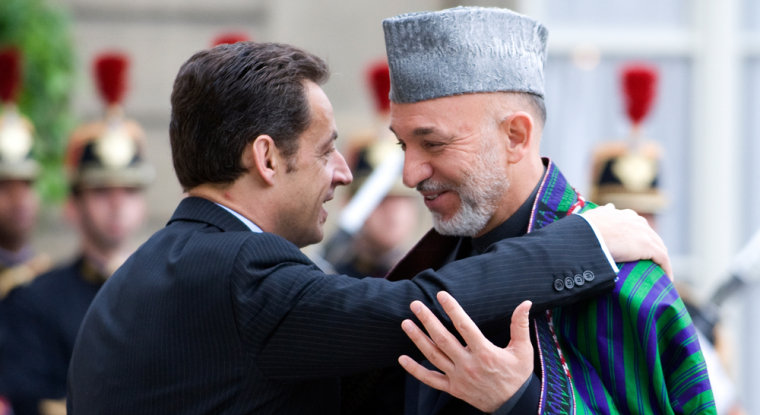Afghanistan's president appealed to world donors Thursday for massive, long-term aid for police, road-building and agriculture to help make his country safer and his countrymen less hungry.
Hamid Karzai also pledged to fight the pervasive corruption that has hobbled aid efforts and frustrated donors since the 2001 ouster of the Taliban.
"Afghanistan needs large amounts of aid, but precisely how aid is spent is just as important," Karzai told a gathering of some 80 wealthy countries and donor organizations in Paris.
The Afghan government is hoping to secure $15 billion to $20 billion at the conference. The United States set the stage — and upped the pressure on other donors — with $10.2 billion in pledges, announced by First Lady Laura Bush.
'Decisive moment'
"Afghanistan has reached a decisive moment for its future. We must not turn our back on this opportunity," Bush told conference attendees.
Karzai presented a development plan to the donors, saying his country needs $50 billion over the next five years to boost an economy shattered by a quarter-century of war.
U.N. Secretary-General Ban Ki-moon urged world donors to coordinate and intensify their efforts to aid Afghanistan — and to insist on better governance by the Afghans.
"Every act of corruption is a deliberate act by someone in a position of authority," he said.
Drug trade
Karzai said increasing the number of farmers and making them less dependent on the drug trade is crucial to Afghanistan's future.
Donors agree the needs are urgent and enormous.
Most Afghans still live in mud-brick homes without proper sanitation and 80 percent have no electricity, despite receiving $15 billion in international aid since the Taliban's ouster. Life expectancy remains under 50 years, and food shortages over the past year have pushed many Afghans to the brink.
The Taliban still recruit in desperately poor rural areas, and their insurgency continues to claim lives more than six years after U.S.-led troops invaded in the wake of the Sept. 11 terrorist attacks. Some 65,000 foreign soldiers patrol the country.
Drugs are a key part of the economy. The world's top opium producer was also the site of what U.S. officials Wednesday called one of the world's biggest drug busts: the seizure of 260 tons of hashish hidden in 6-foot-deep trenches in southern Afghanistan, worth more than $400 million.
Warlords remain powerful
But there is plenty to deter donors.
Corruption is endemic, and the World Bank says it's crippling the legitimacy of Karzai's government. Graft and thievery are bleeding badly needed aid dollars and influencing what gets built and where.
"If the donors just offer more of the same and ignore the need for systemic reform, including a commitment to take on warlords and address impunity, then the situation in Afghanistan is likely to deteriorate," said Brad Adams, Asia director of Human Rights Watch.
Security questions loom over every aid project. Karzai's Western-backed administration has only a fragile grip on much of the country.
"It is a mistake to think of security and reconstruction as somehow different parts of the problem," U.S. Secretary of State Condoleezza Rice said Wednesday. "They are actually part of the solution together. Without one or the other you're not going to solve the problems of Afghanistan."
Laura Bush said the U.S. is dedicating $10.2 billion over five years for Afghan development. The money is a mix of what Congress has already approved for this year and next, and what the Bush administration is still seeking before it leaves office.
Germany has pledged $653 million to support reconstruction efforts in Afghanistan through 2010. Norway's civilian aid to Afghanistan will remain at $145 million a year for the next five years.
U.S. and French diplomats said they would be content if the contributions Thursday reach the levels of the London donors conference in 2006, which gathered pledges of $10.5 billion.
The U.S. is the single largest donor to Afghanistan, not counting the cost of the ongoing war against insurgents.
No sign of 'Marshall Plan'?
But Sen. Joe Biden, the Delaware Democrat who chairs the Senate Foreign Relations Committee, said Wednesday that the Bush administration was giving Afghanistan too little money for development.
"The administration has consistently under-resourced Afghan reconstruction — and seems likely to continue re-committing the same pot of already-pledged money again in Paris," Biden said in a statement released by his office.
"Six and a half years after the ouster of the Taliban, it's hard to believe that our development efforts fall so far short of the Marshall Plan promised by President Bush," he added.
That war is unlikely to end soon: The Afghan government, in its development strategy to be unveiled Thursday, envisions peace by 2020.
